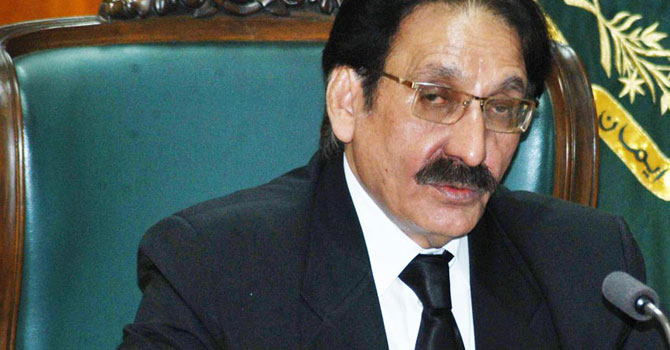
ISLAMABAD: Chief Justice Iftikhar Mohammad Chaudhry emphasised on Monday that missiles and tanks never guaranteed stability and security of a country nor were considered manifestation of a ‘hard power’.
“Gone are the days when stability and security of the country was defined in terms of number of missiles and tanks as a manifestation of hard power available at the disposal of the state,” the chief justice said while speaking to a delegation of the 97th National Management Course, National School of Public Policy and National Management College Lahore at the Supreme Court building.
It was more of a coincidence that the statement of the chief justice came soon after the speech of the Chief of Army Staff General Ashfaq Parvez Kayani and Sunday’s statement by President Asif Zardari.
Speaking to a group of officers at the GHQ, Gen Kayani said no individual or institution had the monopoly to decide what was right or wrong in defining the ultimate national interest.
And President Zardari said parliament might still be under attack from certain quarters, but these were teething troubles of a genuine democratic transition and dying kicks of the old order.
But the speech of the chief justice was focused more on the importance of constitutionalism and its role in evolving economic and social development to achieve the cherished goal of a welfare state.
The CJ’s speech was prepared much earlier and the meeting with the young officers was pre-arranged since a request to this effect had been received by the court office on Oct 11, a senior court official told Dawn.
The chief justice regretted that weak administration and failure of implementation framework was writ large everywhere. “There seems to be no cohesive efforts in terms of a national framework wherein the mega issues have been tackled in an appropriate manner.”
Therefore, he said, heavy responsibility lay upon the Supreme Court judges for being the guardian and protector of the Constitution to uphold the canons of constitution’s predominance and its supremacy over all other institutions and authorities.
“The composition, powers and jurisdiction of the Supreme Court are set out by the Constitution itself and the court exercises original, appellate, review and advisory jurisdictions and its decisions are binding on all other courts of Pakistan,” he said.
The chief justice emphasised that the implementation of fundamental rights enshrined in the Constitution was sine qua non of a truly independent and welfare state.
“Today, the concept of national security has been redefined as a polity wherein a state is bound to provide its citizens with overwhelming, social security and welfare nets and to protect their natural and civil rights at all costs. Thus, the executive branch of the country ably assisted by professionally trained civil service is bound to provide a conducive environment where the vast majority of people are able to make progress in various disciplines of their choices,” he said.
Strong institutions, the chief justice said, formed the bedrock for building everlasting mechanisms and sustaining socio-economic, political and cultural growth and development. For a developing country like Pakistan, the basic requirement for enhancing national growth through competitiveness was pegged on four pillars -- strengthening of institutions, infrastructure, economic stability and health and education, he said.
The chief justice said: “If rules and regulations always create a level-playing field and provide equal opportunity to all under the Constitution and law, then a society is bound to grow. On the other hand, if the dice is loaded against the majority, the environment will generate frustration and distortions leading to chaos and restlessness in the society.
“If we reward merit and hard work, strictly enforce rule of law and supremacy of the Constitution and if the citizens trust the system and think it provides them fair opportunity to realise their dreams in a transparent manner and the present system has the capacity to discourage the corrupt and rent seekers and we have a system where civil and property rights are protected and contracts are fully enforced, then we can claim that the rules and regulations in practice here are transparent and fair. “But if, unfortunately, the answer is no, then the system is distorted and does not provide a level-playing field for people to achieve in life whatever they are capable of.
“The present day Supreme Court is alive to the fact that it has been restored to its original position by unprecedented struggle carried out by a consort of such professional classes as lawyers, students, media persons and civil society at large.”











































Dear visitor, the comments section is undergoing an overhaul and will return soon.